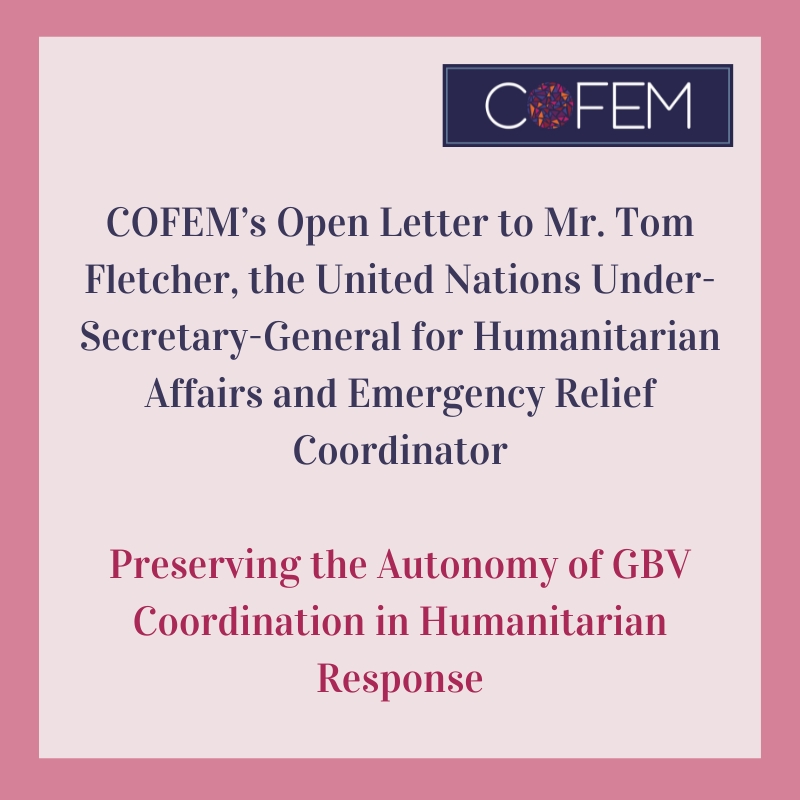Subject: Preserving the Autonomy of GBV Coordination in Humanitarian Response
The Coalition of Feminists for Social Change (COFEM) is writing to express deep concern regarding the proposal to dissolve the Gender-Based Violence (GBV) Area of Responsibility into the broader Protection Cluster as part of the “humanitarian reset.”
While the intent to streamline humanitarian systems is commendable, collapsing the GBV AoR into the Protection Cluster such that it no longer functions independently risks undermining many thematic priorities and commitments of humanitarian action, including localization, accountability to affected populations, durable solutions, and the ability to effectively prevent and respond to GBV.
In 2017, COFEM published a paper illustrating how merging GBV into a generalized protection framework often leads to the marginalization of women and girls, with drastic consequences. We wrote this paper based on feedback from our members (over 400 globally) who were urging COFEM to speak to an issue that many members were seeing on the ground. The broad focus of protection is not always gender-sensitive, nor does it consistently ensure that the voices of women and girls are being heard.
In addition, without dedicated GBV structures, the expertise required to safely and ethically address GBV can be lost. All of these issues undermine the overall success of humanitarian action.
Your recent statements emphasize the necessity of reimagining humanitarian efforts to shift power towards national actors, especially affected communities. Maintaining a distinct GBV coordination mechanism is crucial to achieving this goal. The GBV sector has a strong history of productive collaboration with other sectors, including Protection, and cross-sectoral partnerships are essential to ensuring that GBV risk mitigation is embedded across humanitarian action.
Protection, Child Protection, and GBV must be treated with equal importance, particularly at the coordination level. However, arguably more than any other humanitarian sector, the GBV sector has progressed on localization, with hundreds upon hundreds of women’s rights organizations involved in coordination mechanisms across the countries with GBV sub-clusters.
The GBV AoR also supports localization in the global membership and has a localization task force. Effectively addressing GBV requires approaches during the emergency that build out systems which are sustained through recovery to development. Humanitarians already know that interventions solely focused on delivering immediate life-saving needs without facilitating and investing in local systems can be more costly to humanitarianism and to affected communities in the long run.
Evidence also indicates that supporting gender equality interventions, including addressing GBV in the context of acute emergencies, can promote more stable and peaceful states. This means that GBV interventions must be led by an agency that has the ability to shift its operations from humanitarian to recovery to development. UNFPA has this capacity; UNHCR does not. Especially as we anticipate the impact of climate change on disasters globally, working at the nexus is critical in humanitarian action more generally, and specifically to addressing GBV.
Furthermore, the GBV Area of Responsibility has been instrumental in developing specialized tools and guidance that have significantly improved the quality of GBV programming in emergencies. Dismantling this structure could reverse gains, ultimately compromising the safety and dignity of those most at risk.
Importantly, dissolving the GBV AoR into the Protection Cluster is not what is wanted or recommended by GBV specialists such as those in the COFEM membership, or many hundreds of women’s organizations working with the GBV AoR. We strongly advocate for oversight for GBV coordination and programming remaining with UNFPA rather than a broad protection agency with limited presence globally.
We urge you to uphold a specialized GBV coordination mechanism within any revisions to the humanitarian structure, led by UNFPA. We would be happy to provide your office with further thoughts and reflections from our membership.
Sincerely,
The COFEM Coordinating Committee
